In 2017, Honey & Wax Booksellers established an annual prize for American women book collectors, aged 30 years and younger. Our goal, at the time, was to expand the popular perception of who book collectors are (and can be) by highlighting original collections built by young women, often without the knowledge or help of the rare book trade. By celebrating their achievements, we hoped to inspire potential collectors to look at their shelves differently, to identify patterns and projects, to think creatively about what aspects of the historical record they might be uniquely qualified to recognize and preserve.
The response to this prize over the past six years has exceeded all of our expectations. The competition this year was fierce: we wish we had been able to recognize more of the ambitious collections offered for consideration. That said, we are delighted to announce the $1,000 winner of the 2022 Honey & Wax Book Collecting Prize:
WINNER
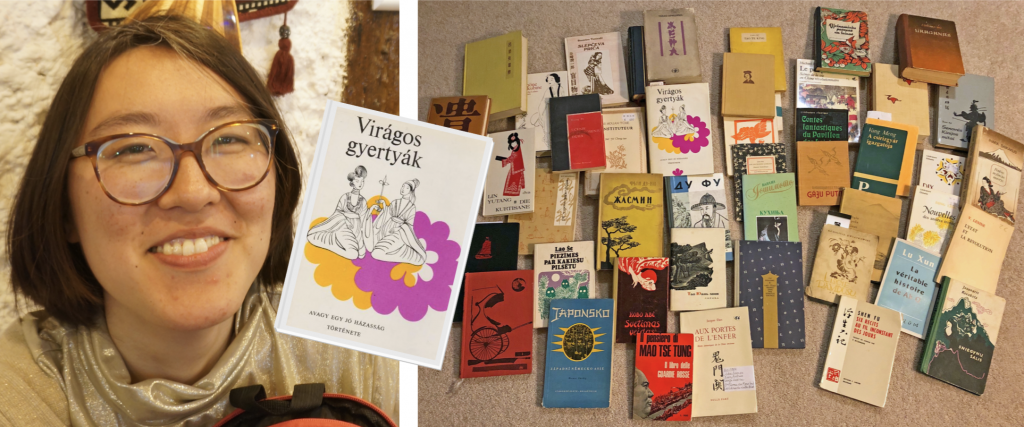
Melanie Shi, 24, (she/her), of Flower Mound, Texas, a graduate student at the Institut des Langues et Civilisations Orientales in Paris, for “East of France, West of Russia: Cold War Europe and the Chinese Book,” a collection of translations of ancient and modern Chinese works marketed by European publishers during the Cold War. Examining the role that romantic and political ideas of “Chineseness” played in different national contexts after WWII, Shi argues that “the history of postwar Europe can be told through the Chinese book:”
“No matter where I am, I am unconsciously drawn to books with oriental motifs, just as I am drawn to Chinese populations. Chinese people are everywhere—and everywhere bound by linguistic and cultural ties to the mainland and the tumultuous politics of the last half-century…. During the Cold War, each European nation articulated a particular stance and taste for
Chinese literature that could be used as an arbiter both of cultural tastes and of attitudes towards communism, represented by China, at any given moment, all the while the relationship between China and Russia fluctuated as well.”
This was Shi’s second time applying to the prize; she received an honorable mention in 2021, with a collection of cross-cultural books published and purchased by the Chinese diaspora in New York City. This latest collection reflects the energetic scouting, keen eye, and habits of inquiry Shi honed in Chinatown, but it is more ambitious in every way. Her collection reflects an awareness of multiple angles of each book: the text, the translation, the physical object, the publishers, the readers, the political context. Whether “China,” as an idea, is serving as shorthand for “Communism” in Eastern Bloc countries, or as an imperial fantasy represented by “sumptuous novels from the Ming and Qing dynasties” in France, Shi makes a compelling case for the role these books played in postwar debates about Western power.
You can read Shi’s winning essay and bibliography here.
We are also awarding five honorable mentions of $250 each:
HONORABLE MENTIONS
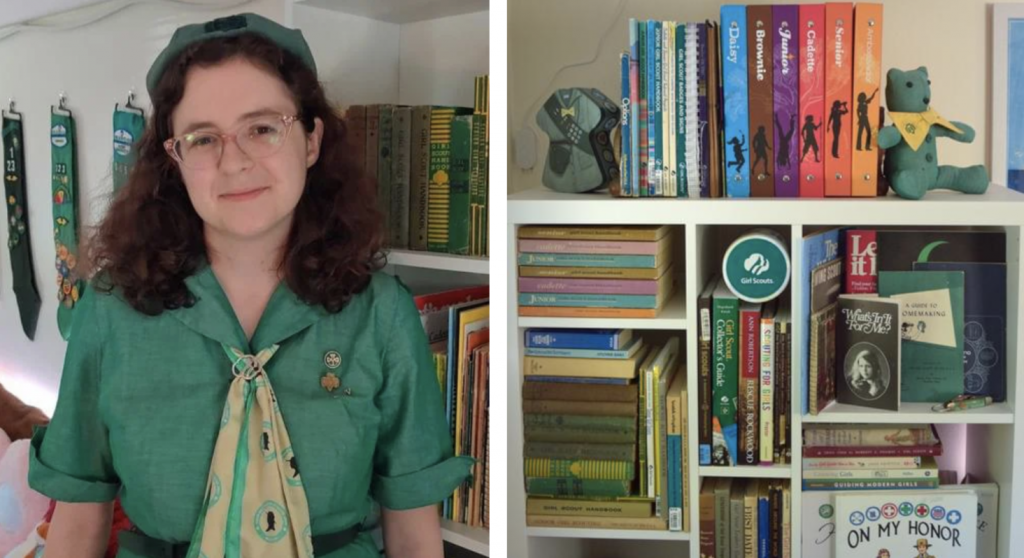
Elsie Birnbaum, 24, (she/her), a technical video producer in Wayland, MA, for “The Girl Scout Handbook: A Portal to Girlhoods Past,” a collection that surveys nearly a century of Girl Scout handbooks and other official scouting publications, tracing the changing (and often contradictory) cultural expectations regarding family, work, education, religion, and virtually everything else, as directed at American girls. Birnbaum sets out to “challenge the idea of the apolitical girlhood”:
“To this day, the Girl Scouts as an organization has to negotiate its role as both an organization that offers girls adventure and one that rears them into appropriate young women – which is what makes their handbooks such appealing historical documents. Scouting exists not only as an activity but as a lifestyle, and the Girl Scout handbook is an instructional manual about how Girl Scouts ought to behave, not only in troop meetings, but in their families, communities, and country.”
We admired the depth of Birnbaum’s collection, from the classic handbooks to surprising outliers: a 1950s pamphlet on homemaking for Scouts issued by Stanley Home Products to convert future housewives; a 1966 guide to Girl Scouting and the Jewish Girl; a 1973 calendar published for troops in Dhahran, Saudi Arabia; a 1995 resource book for teen Scouts dealing with the AIDS crisis. Birnbaum’s project demonstrates how a tight, disciplined focus can produce a collection with much broader relevance.
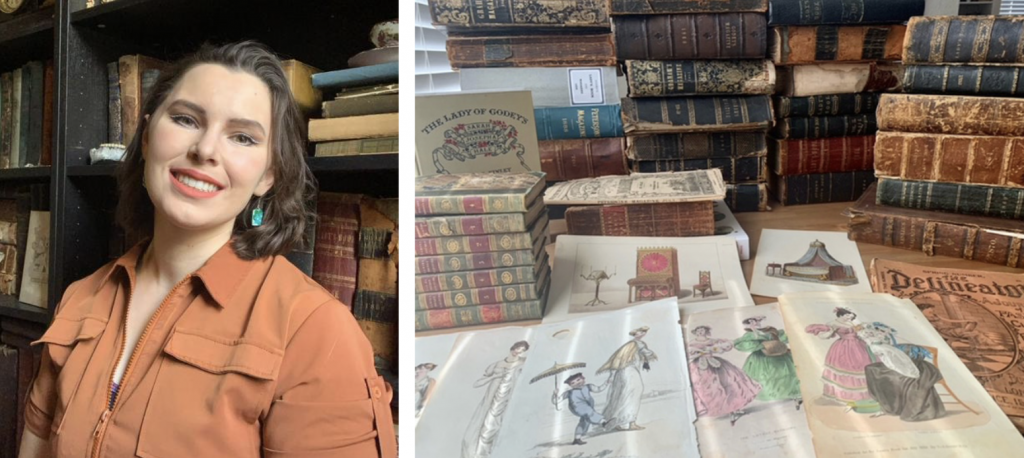
Alyssa Despain, 29, (she/her), a technical support consultant in Orlando, FL, for “Old-Fashioned Influencing: Nineteenth-Century Women’s Magazines,” a collection of American and European leisure periodicals produced for a female readership. While Despain was originally attracted to the hand-colored fashion plates featured in magazines like Godey’s Lady’s Book and Peterson’s, she became increasingly interested in the juxtaposition of those images with the literary content that ran alongside them:
“Another eye-opener for me was that women’s fashion magazines often contain macabre stories…. the 1842 Godey’s contained the first printing of [Edgar Allan Poe’s] “The Cask of Amontillado.” I recently found a piece in the 1831 Pocket Magazine that vividly told the story of an anatomist that enjoyed dissecting corpses because it gave him a feeling of power. I used to have a perception of nineteenth-century women being very dainty, but now I realize that if they lived today, a lot of them might be really into Law and Order or the same true crime podcasts I listen to.”
We enjoyed following Despain’s trajectory from buying “anything I could afford that was pretty and over 100 years old” to delving deeply into the magazines, editors, and publishers that most interested her, an investigative impulse showcased in her detailed bibliography. Each volume she acquires leads to new questions, and new acquisitions. We also appreciated her take on the pleasures of collecting: “a hobby that is kept alive by small sellers,” rather than a “‘fast-fashion’ style of buying new products being pumped out of factories.”
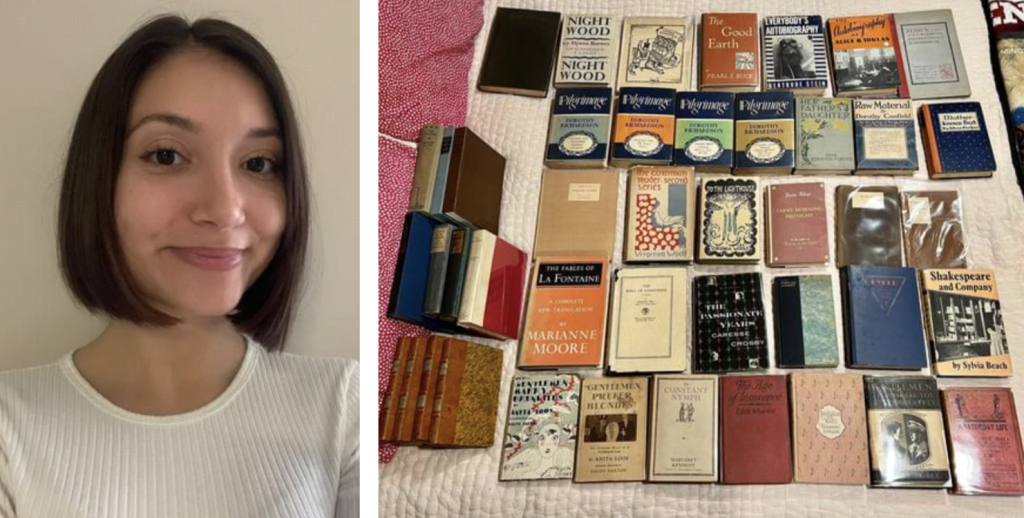
Francesca Mancino, 24, (she/her), of Monaca, PA, creator and lead editor of Lost Modernists, for “Reassessing Modernism: Women Writers and Publishers of the Lost Generation,” a collection of modernist literature with an emphasis on women writers and publishers who achieved success in the 1920s and 1930s, but are largely forgotten today:
“Modernism cannot be fully apprehended through what is now canonical. Rather, we must contextualize the literary period by asking questions, such as: Which female members of the Lost Generation were popular in their time and why? How did the work of female publishers during this time influence what was or was not read? But, most importantly, how do our understandings of modernism shift by reassessing the period by encompassing marginal women writers and their writings?”
Mancino employed a number of strategies to find many of the out-of-print books in her collection: she checked Sylvia Beach’s bookstore records (now online at Princeton’s Shakespeare & Company Project) to see which authors sold best, year over year; used publishers’ dust jacket copy to track down adjacent titles; and scoured little magazines like Broom, the Dial, and Poetry for clues in advertisements and reviews. The result is a collection of writers, including Evelyn Scott, Margaret Kennedy, Rosamond Lehmann, and Élisabeth de Gramont, whose revival complicates the study of the Lost Generation.
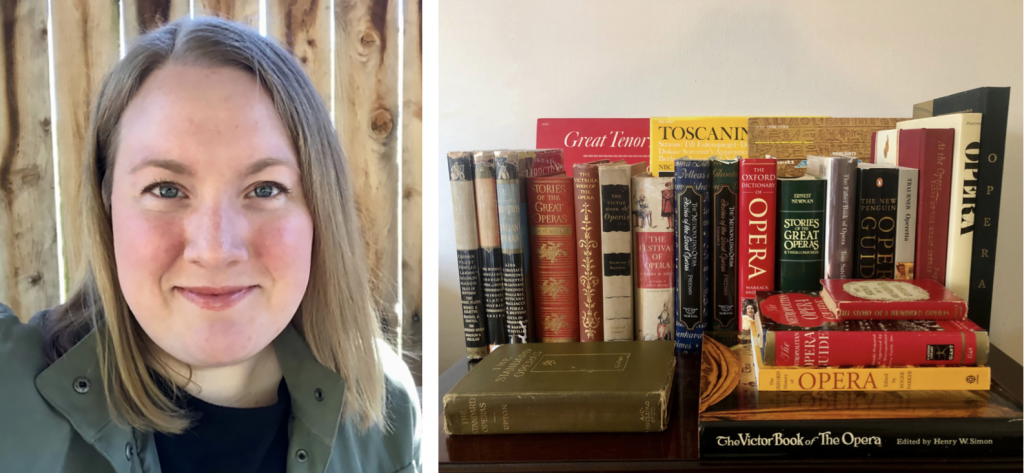
Caroline Rogers, 31, (she/her), a writer and editor in Moultrie, GA, for “From Aïda to Zauberflöte: Reading Opera in the 20th and 21st Centuries,” a collection of published guides to the opera, from reference compendiums to individual libretti and critical studies, with an emphasis on the way that writing about the performances and audiences has developed over time:
“It’s the shifts in their details—the operas they include, the ways they describe them, the new compositions they add, the ones they leave out—that show me opera has always been evolving the ways it represents itself both onstage and in print. . . . The volumes illustrate a journey from the opera boom of the early twentieth century to widespread radio broadcasting, from the advent of television to the live streams that come to movie theaters today.”
We appreciated Rogers’s attention to the real-life uses of the books in her collection, from encyclopedias to pocket guides, epitomized by a 1914 edition of The Standard Operas presented as a gift to a young piano student, who recorded every opera she attended for the next forty years on the endpapers: “an example of the ways our personal histories can weave themselves into the books we keep . . . proof that both opera and collecting can be lifelong experiences.”
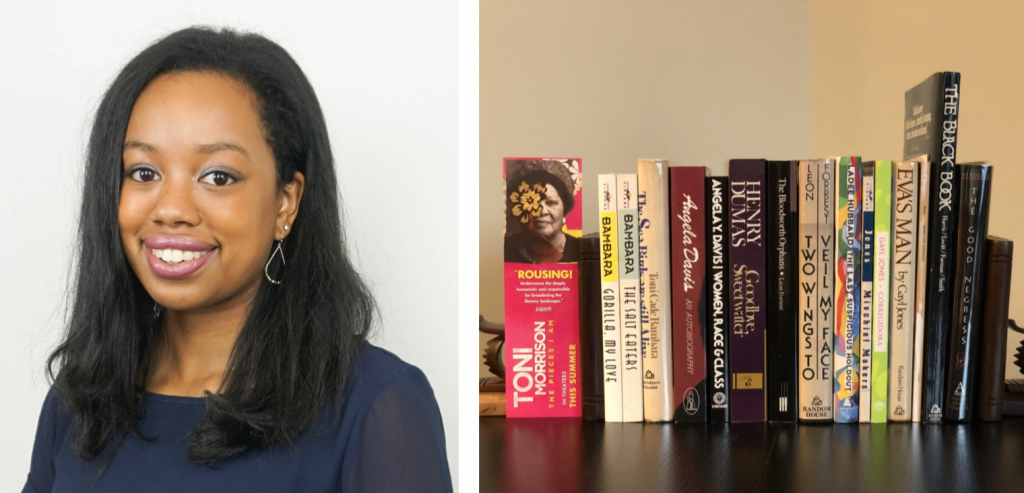
Ariana Valderrama, 28, (she/her), a nonprofit communications director and bookseller in Washington, D.C., for “Toni Morrison as a Reader: Collecting Her Editorial Legacy,” a collection that started with Morrison’s own books, then turned to her impact as a literary tastemaker, both in the titles she edited at Random House, and in her promotional efforts on behalf of fellow writers:
“As I went down the rabbit hole of studying Morrison’s work as both an author and editor, I decided to expand my collector focus to also include books she’d blurbed, since those seemed to be rare yet noteworthy…. I did not want to limit myself to only reading the books Morrison had specifically edited; my goal is to read the oeuvre of every author she
edited, even if she did not edit all their books. Her editing career was somewhat short-lived, but that does not mean she no longer supported the authors themselves.”
Many young collectors become discouraged when they realize that their project, as originally conceived, will be expensive to complete: in this case, a first edition run of a Nobel Prize winning novelist. We were impressed by Valderrama’s pivot to Morrison’s work as an editor and reviewer, which not only makes for a more affordable collection, but also a more original and surprising one. We recognized that same openness and spirit of discovery in Valderrama’s exploration of the Black Bookstagrammer community.
The co-founders of the Honey & Wax Prize, Heather O’Donnell of Honey & Wax Booksellers and Rebecca Romney of Type Punch Matrix, would like to thank our 2022 sponsors: Biblio, Bibliopolis, The Caxton Club, Swann Galleries, and Ellen A. Michelson. Thanks also to Lit Hub, Antiquarian Booksellers’ Association of America, and Fine Books & Collections for their ongoing support. Most of all, thanks to the inspiring young collectors who shared their ongoing projects with us! We look forward to seeing where they take you.









